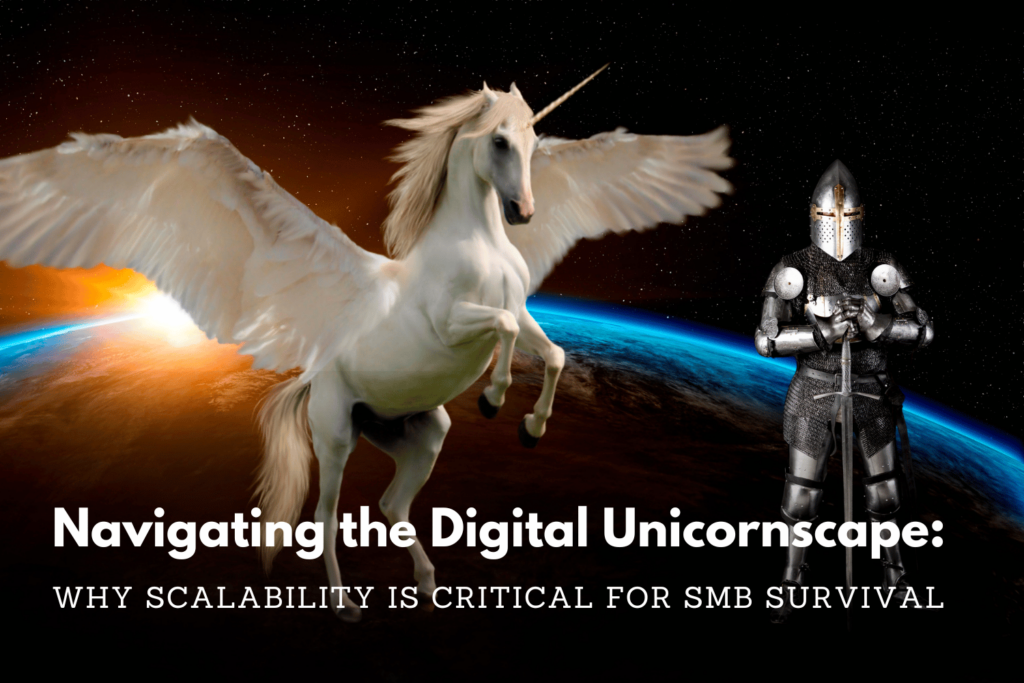Technology Scalability for SMBs
Technology can be such a boring subject. Let’s have some fun with this topic!
The business landscape resembles a mythical unicorn’s realm in a way, adorned with promises of growth, agility, and innovation. However, much like unicorns, not all technology solutions are created equal.
For small and medium-sized businesses (SMBs), finding a digital strategy that not only works but can also flex and grow as the company does, is the modern-day quest for the Holy Grail.
This comprehensive guide unfolds why technology scalability is the compass every SMB needs to steer through the vast digital terrain, and how IT Managed Service providers stand as noble knights in your business-as-unusual roundtable.
The Evolutionary Imperative of SMB Technology
In a matter of decades, technology has transitioned from being an organizational tool to a business core, a shift that’s reshaping how SMBs need to approach their IT infrastructure. Companies are no longer judged by the mere presence of technology but by the agility and scalability through which it can be harnessed to answer the calls of market evolution.
The Journey from Legacy to Scalable Systems
Historically, many SMBs have rooted themselves in legacy systems – reliable at the time but now akin to armor that’s too heavy to keep up with the pace of modern competitive jousting. These systems, often monolithic and rigid, are the antithesis of scalability, the primary feature demanded by an increasingly volatile market.
Scalability as a Strategic Weapon
Scalable technology, on the other hand, offers a strategic upper hand. It’s not merely a response to growth but a facilitator, enabling SMBs to innovate without the fear of outstripping their technical capabilities. Cloud computing services with their pay-as-you-go models, for instance, are paradigmatic examples of scalable architecture, adapting to usage like an elastic band, ready to snap back or stretch forth as business demands.
Understanding Scalability and Its Spectrum
But what does scalability truly entail? And how does it differ from mere flexibility?
The Definition of Scalability
Scalability is the measure of how well a system can adapt under a growing or changing workload. It is about being able to handle more capacity (vertical scalability) or more significant demands (horizontal scalability) without major changes to the system’s architecture while maintaining a high level of performance.
Flexibility vs. Scalability: A Distinction
Flexibility is about the range of different workloads a system can handle effectively, often with system modifications. Scalability is more focused on how easily and efficiently you can grow or reduce those workloads. An elastic band is flexible – you can use it to hold a tiny bundle or a large one, but if you stretch it too far, it doesn’t snap back. A healthcare system that can handle 1,000 patients instead of just 500 is scalable.
The Benefits of Scalability to SMBs
From cost savings to customer satisfaction, scalability delivers multiple advantages to SMBs. These benefits are not mere business luxuries but form the very basis of sound business strategy.
Driven Growth and Cost Optimization
Scalable technology provides SMBs with the wings to grow and the wisps to optimize costs. Instead of committing to heavy up-front investments, scalable solutions allow for incremental spending that parallels business expansion, captured by entrepreneurs and CFOs as the sweet, sweet sound of capital not wasted.
Enhancing Operational Efficiency
Operational efficiency is the highway to business prosperity, and scalability maps out that route. When a company introduces a new product line, a scalable technology infrastructure ensures processes to support it are inaugurated with minimum turbulence, ensuring the efficiency sails smoothly.
Elevating Customer Experience
Customer experience isn’t just about a polite thank-you note; it’s a technological ballet that needs to harmoniously dance with customer demands. Scalability ensures that customer-facing technologies can jitterbug in tandem with real-time demands, offering a seamless – and critically scalable – experience.
Overcoming the Scalability Hurdles
Of course, the pathway to technological scalability isn’t always paved with gold. SMBs can encounter a host of challenges on this quest.
Technical Compatibility and Interoperability
New scalable technologies may not march in perfect step with existing systems, resulting in compatibility and interoperability conundrums that require expert alignment for a harmonious march.
Resource Constraints
The wherewithal to scale can’t always match the will. Resource constraints, both in terms of capital and skilled personnel, often stand as hurdles in an SMB’s scalability stride.
The Learning Curve
Transitioning to scalable solutions demands mastering new tools and technologies, a learning curve that can mask the short-term benefit behind an intimidating facade of complexity.
Implementing Scalable Solutions: A How-To Guide for SMBs
Scaling technology is equal parts an art and a science. SMBs must wield both with finesse to achieve their full potential.
Assessing Current and Future Needs
Understanding what scalability means for your SMB’s distinct context is the crucial first step. What are your current technology bottlenecks, and how will scalable solutions uncork them? What areas of business expansion can and should be driven by scalable technology?
Choosing the Right Scalable Infrastructure
The market burgeons with scalable technology providers, but not all knights have equally shiny armor. SMBs must meticulously choose infrastructure that aligns with their strategic plans, evaluating not just the present prowess but also the roadmaps of their scalability vendors.
Strategic Deployment and Management
The war isn’t won merely by hoisting a sword, but by knowing when and how to use it. Strategic deployment of scalable solutions within the SMB’s technological ecosystem demands an acute synchronization of business and IT strategies.
Continuous Monitoring and Adjustment
Scalability isn’t a set-it-and-forget-it affair. It’s a steady course of continuous monitoring and adjustment to keep up with the business’s tides. SMBs must develop agile mechanisms that routinely gauge the effectiveness and relevance of their scalable systems.
Success in Scalability: The Chronicles of SMBs and Their Unicorns
The virtual fairytale of scalable technology isn’t mythical; it’s historical. SMBs around the globe have ridden their unicorns of scalability to unprecedented heights, and their accounts inspire emulation rather than awe.
The E-Commerce Expedition
An e-commerce SMB, anticipating the seasonal spikes of Black Friday, embraced a cloud-based scalable system that ensured their platform was as fast and reliable as their in-person stores, even during the virtual rush hours.
The Customer-Centric Crusade
A service-oriented SMB, integrating a scalable CRM system, witnessed a dramatic uptick in customer retention and satisfaction, all the while battling the influx of data and the complexity of maintaining customer relationships at scale.
The Lean, Green, Scalable Machine
A manufacturing SMB, once hindered by the immensity of its production data, wedged scalable analytics tools into its operation, slicing waste and enhancing quality, proving that the lean, green path can indeed be the scalable one.
The Final Allegory of Scalability for SMBs
In the mythical realm of the digital unicornscape, scalability isn’t just a nice-to-have; it’s the very heart of the quest. It’s an allegory that underlines the indispensable role scalable technology plays in the longevity and prosperity of SMBs.
A Call to Arms (and Fingers) for SMBs
The technology knights are mustering at the gates of SMBs, bearing the banners of scalability. It’s not a siege; it’s an invitation for SMBs to fortify their digital forts with the artillery of scalable technology, and emerge not just unscathed, but victorious, in the battle for the consumer’s soul.
In the end, it’s not necessarily about the size of your business or the zeroes on your investment. It’s about the zeros and ones, the language of the digital domain. And with the right IT Managed Service provider at your side, these zeros and ones can translate to success stories filled with scalable growth, efficient operations, and unmatched customer experiences.
The next chapter of the digital unicornscape is being written as you read these very words. Will your SMB be the protagonist, riding high on the wings of technology scalability, or will it remain a footnote in the annals of SMB lore? The choice is yours, and with the aid of scalable IT solutions, the odds are certainly in your favor.
FAQs
Q: What is scalability in the context of customer experience?
A: Scalability refers to the ability of customer-facing technologies to adjust and grow seamlessly with real-time demands, ensuring a positive and efficient experience for customers. It involves using scalable solutions that can handle increases in demand without compromising on performance.
Q: What are some challenges that SMBs may face when trying to implement scalable solutions?
A: Some challenges that SMBs may face include technical compatibility and interoperability issues, resource constraints, and the learning curve associated with adopting new technologies. It is important for SMBs to carefully assess their current and future needs, choose the right infrastructure, and strategically deploy and monitor their scalable solutions.
Q: Can implementing scalable technology really lead to success for SMBs?
A: Yes, implementing scalable technology can have a significant positive impact on the success of SMBs. It allows for efficient and sustainable growth, improved customer experiences, and streamlined operations. Many successful SMBs have attributed their success to the adoption of scalable technology solutions.
Q: How can SMBs ensure the scalability of their IT systems?
A: SMBs can ensure scalability by partnering with a reliable and experienced IT Managed Service provider who can assess their current infrastructure, strategize for scalable growth, and continuously monitor and adjust their systems. It is also important for SMBs to regularly reassess and update their technology strategies to stay ahead of changing market trends and demands.
Q: Is scalability only relevant for larger businesses?
A: No, scalability is relevant for businesses of all sizes. SMBs can benefit greatly from implementing scalable technology solutions that allow them to grow and adapt in a rapidly changing digital landscape. In fact, investing in scalable technology can give SMBs a competitive edge over larger businesses by allowing them to be agile and responsive to market demands.



